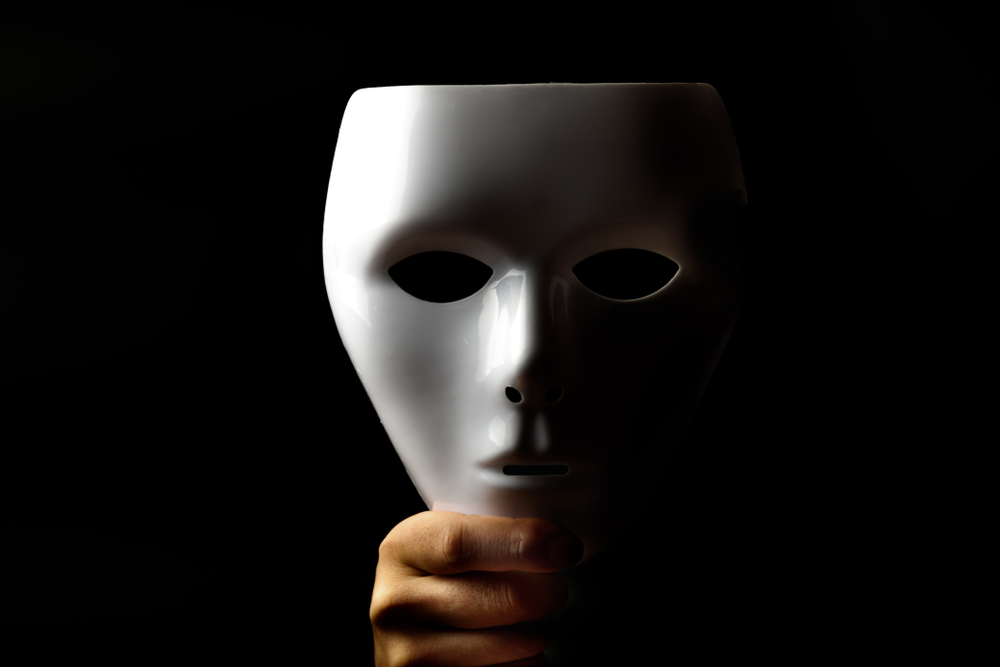A pseudonym is a name that will ‘stand in’ or ‘de-identify’ a person, to allow them to mask their true identity. In a broader environment, pseudonyms are often used in data and research to protect an identity and encourage honesty – not to mention today’s rising use of pseudonyms as social media handles to either create an alternative persona or brand, or to protect personal details in an environment rife with hacks and trolls. But how popular are pseudonyms in the arts?
Some creatives will have ‘stage names’ in performing arts circles as a way to help separate their private lives from their public image. In the visual arts, it is most common for a street or urban artist to adopt a pseudonym to create an identity and protect their activities. The most famous would be the British street artist Banksy.
However, the most common use of pseudonyms in the arts is in publishing. For some authors, it allows them to take an alternative voice, while for others – especially first-time writers – it is a way to test the waters, and to avoid embarrassment if the book is a flop.
ArtsHub decided to test the reasons for, and the effectiveness of, taking the pseudonym path.
How long have you used a pseudonym, and why?
Wolfgang von Flügelhorn (a pseudonym) has been publishing under this name for the past two years. In the words of his friend and colleague the actor and writer Humphrey Bower: ‘Wolfgang has his own unique style of writing and perspective on things, which is similar, but not identical to mine. He also has an emerging identity in terms of background and life story, which adds flavour and perspective to his reviews.’
Creative identity is also the reason that artist and academic, Dr Kate Murphy, has adopted a pseudonym. She creates and exhibits under the name of Ellis Hutch. Murphy has been using this pseudonym since the late 90s, and says, ‘Initially, it was because there were a couple of other people with the same name as me working in the arts in the same town. People were getting us confused. One other Kate Murphy, in particular, studied at the same art school around the same time, so it was very confusing for people around us.
‘When I chose the pseudonym – I intentionally chose a name that would be unlikely to be repeated and also a name that is gender neutral,’ Murphy adds.
Writer, poet and arts professional, Kate Larsen says she has used a pseudonym (Katie Keys or @tinylittlepoems) for many years, ‘until my creative practice and professional life came together at Writers Victoria and my pen-name became better known than my actual name’.
She continues, ‘I began using a pseudonym (Katie Keys) because of nepotism, not wanting London’s street press to realise the music reviews I was writing were often of my brother’s band. I kept it when I started posting a poem a day on social media (which I did for more than a decade), so my Twitter handle @TinyLittlePoems became a sort of secondary pseudonym too.’
While for some creatives it is about creating an identity, for others it is all about protecting an identity. Artist Luke Cornish has been using E.L.K as a pseudonym for about 20 years. ‘It is very common, if not compulsory, to have an alias as an urban artist, when a high percentage of the work you create is unsanctioned or illegal,’ he says.
However, he adds, ‘Since adopting a more studio-based practice, the need for being incognito is obsolete, though I’ve never actively tried too hard to separate my real name and E.L.K. I have a sentimental attachment to my chosen name, I’m happy for people to know me as that.’
Staying incognito is also the reason that writer Vivienne Pearson has occasionally used a pseudonym. ‘I’ve used a pseudonym twice, both times for parenting articles,’ she says. ‘I wrote under my own name when my kids were younger, and I have started to again now that my children are old enough to read drafts and provide proper consent, but there was a middle period where I felt it was safer and more respectful to simply write under a pseudonym,’ she explains.
It was a similar case for author Gretchen Miller, who first used a pseudonym in 2020. She tells ArtsHub: ‘I use a pseudonym to write about my experiences with my kiddo – to protect their privacy. But also to be able to speak my own story, which we writers often feel compelled to tell, right? I always use the same one, so management isn’t an issue.’
Different names; different voices
Bower says that delegating his role as a reviewer to his friend and colleague von Flügelhorn can ‘open up the possibility for a different kind of critical writing’. He believes ‘there is a special role for artist-critics who are also practitioners of the art form they are critiquing’.
He adds, ‘The role of such a critic is precisely “a role”. This role has its own special challenges, and Wolfgang has a way of addressing these challenges, and constructing an ‘identity’ for the critic, which acknowledges an ironic distance between our two roles of artist and critic, without necessarily denying our relationship or avoiding accountability.’
Von Flügelhorn adds that his role models include George Bernard Shaw (who wrote music criticism under the pseudonym of Corno di Bassetto) and Søren Kierkegaard (most of whose works were written using a series of pseudonyms).
The other well-known case is JK Rowling, who adopted the name Robert Galbraith to publish The Cormoran Strike crime novels, giving the reason that she ‘really wanted to go back to the beginning of a writing career in this new genre, to work without hype or expectation and to receive totally unvarnished feedback’.
‘I wanted it to be just about the writing,’ she said.
Rowling elaborated on this in an interview with the US’s National Public Radio: ‘There was a phenomenal amount of pressure that went with being the writer of Harry Potter, and that aspect of publishing those books I do not particularly miss. So you can probably understand the appeal of going away and creating something very different, and just letting it stand or fall on its own merits.’
While we may not all be as high profile as Rowling, there are advantages to compartmentalising our voices as writers, or other roles as artists and performers.
Larsen says, ‘Using a pseudonym can help artists explore a new genre, build a different audience or give them the confidence they need to share their work. It wasn’t until I became Director of Writers Victoria that my creative practice and professional life came together. When someone unknowingly recommended I check out my own work, I realised my pseudo-name had become better known than my actual-name and set about merging the two back together (to @KateLarsenKeys).’
Practical tips by pseudonym-users
When it comes to separating and managing different roles, Bower says: ‘Broadly speaking it depends on the platform. Increasingly, Wolfgang writes reviews for my blog and for some other public platforms. I tend to write in my own name on matters of more general commentary about theatre and the arts.’
In contrast, Pearson says that she doesn’t ‘include those stories using a pseudonym on my website’ and hasn’t shared them, adding that, despite not promoting them herself, she ‘hopes the stories were a good read and helpful to others, even if they haven’t contributed to my portfolio (though I did get paid for them and enjoyed the opportunity to write them and have them published)’.
Murphy says while she hasn’t changed her name legally, ‘lots of people call me by my original name, so there are folks that know me as Kate and others that know me as Ellis,’ adding that she ‘answers to both and sometimes forgets which name I’ve introduced myself as – so I don’t actually manage it very carefully’.
‘Generally, I’m Ellis in everything related to my art practice and online, and I’m Kate outside of that.’
Larsen says that there are often practical reasons of safety when it comes to using a pseudonym in some countries. She tells ArtsHub: ‘While obviously wanting to avoid any association with the anonymous and unaccountable trolls that are perhaps the most common pseudonym users, alternative or pen names can also be useful tools in helping protect ourselves and our work.’
While preparing for her debut poetry collection (Public. Open. Space Fremantle Press, 2023), Larsen surveyed social media poets in Australia, China and Hong Kong, while on an Asialink Arts residency at the Hong Kong Arts Centre. Of her findings she says: ‘When asked how motivations and implications change where access to social media is monitored or controlled, poets in Hong Kong and China said they were more likely to write under a pseudonym and less likely to write about political topics for their personal safety, privacy and freedom.
‘I’m sure there is a degree of self-censorship in most poets and a fear of retribution if people write something less than favourable about political leaders,’ one respondent told Larsen. ‘I use a pen name as I speak about sensitive topics such as race, sexual assault and other personal matters that I would not be comfortable publishing as my own name,’ said another.
To use, or not to use, a pseudonym clearly comes down to why.





